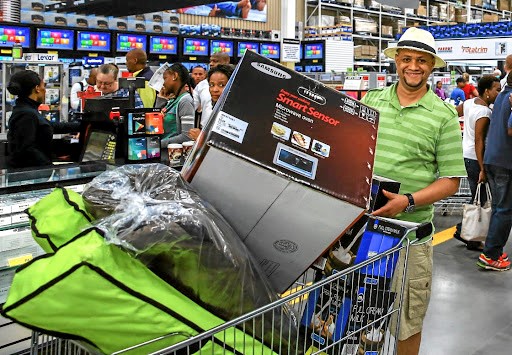- The day’s importance to SA’s nascent e-commerce sector is clear as 352 sites across 29 categories offer promotions for the day
Black Friday promotional sales are transforming the retail sector in South Africa.
What started out as an imported US sales gimmick — Takealot and Checkers both claim they brought it to SA — about four years ago, is now reshaping how South Africans shop.
The SA Reserve Bank referred to its effect in its Quarterly Bulletin in June when it showed a “robust increase” in durable and semi-durable goods in the fourth quarter of 2017. It said this was as a result of “substantial Black Friday promotions”.
Research group Nielsen echoed these findings. It said in its “Black Friday: Heyday or Hype” report that sales in November 2017 were 7.2%, higher than the average for the preceding two months.
It was no different in 2018, with some retailers reporting record sales for the period. E-commerce retailer Takealot said sales for the day were R196m — a 125% year-on-year growth. This is sharply up from the mere R1m it generated from Black Friday in 2015. The group sold R11.5m in merchandise before 1am that day.
E-commerce platforms like Takealot have put a lot of effort into driving sales, and this is evident in the findings of BankservAfrica, Africa’s largest automated payments clearing house. It said sales in online transactions were up 55% to 404,594 on Black Friday, while those for the following Cyber Monday rose 36% to 176,595.
“This year’s Black Friday and Cyber Monday figures surpassed 2017’s with more South Africans taking to online to do their transactions,” said Martin Grunewald, BankservAfrica executive for head of payments business.
The day’s importance to SA’s nascent e-commerce sector could be seen in 352 sites across 29 categories having some kind of promotion for the day, according to digital marketing specialist Nichemarket.
The effect of Black Friday is likely to have grown this year, as many retailers have expanded their promotions from a single day to almost a week. Professional services firm PwC said promotions were starting earlier and lasting longer, morphing into what it called Black November, in an article on consumer behaviour on Black Friday.
There are now signs that Black Friday has not only become a part of the Christmas shopping season, but that it is also boosting it. Nielsen said overall sales for November and December did not suffer after Black Friday in 2017, but rose more than 8%.
Black Friday
Cyber Monday
But not every retailer was a winner on Black Friday this year.
Smaller bricks and mortar retailers struggled to find a foothold in a crowded market, said Vend, a retail management platform provided a payment service to small-to-medium and independent retail stores across Africa.
Vend compared transaction data from 500 retailers and found that sales revenue actually dropped 10% when compared with the same period in 2017. Sales volumes also decreased 2%.
This was despite discounting levels growing 5%, and the average discount amount increasing by 3 percentage points. “While there have been reports that shoppers are still clamouring for Black Friday discounts, our data shows this year has fallen flat,” said Higor Torchia, EMEA country manager for Vend.
Even so, it also found that Black Friday continued to provide a “significant spike” in the retail calendar for these stores. While year-on-year sales had dropped off, spending increased 20%, when compared to the previous weeks in October and November.
Larger retailers have also not had it their own way when it came to Black Friday, as they have found that running these promotion came at a price.
“It’s just actually made retailing more difficult, because you’ve now got this spike at the end of November, which puts additional cost into your supply chain, into your staffing and stores, and really doesn’t really earn you more money,” said outgoing Clicks CEO David Kneale.
Even so, he said the group had no real had no choice when it came to offering Black Friday deals. “The difficulty is if you don’t participate, you lose out.”
The big winners from Black Friday seem to be hard-pressed South African consumers, who in 2018 have had to put up with an increase in the VAT rate, higher fuel prices and rising interest rates. Though many saw it as an opportunity to buy big-ticket electronic goods at a substantial discount, South Africans generally saw it as a chance to stock up on household staples.
According to Nielsen, consumers took the opportunity in 2017 to stock up their pantries by buying stuff like coffee, detergent and margarine. This could also be seen in nappies being the top-selling product for Takealot in 2018.
Kneale summed up what local consumers were doing this way. “In my view what its impact is, is that people do spend more for Black Friday, but first of all, they save for Black Friday. So you’re pre-black Friday sales are depressed. Then they spend a lot of cash, so your early December sales are also depressed.”
Source: Business Day Live

